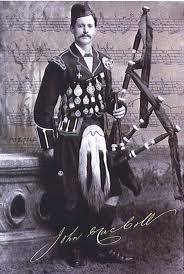Annotation:John MacColl's Farewell: Difference between revisions
No edit summary |
No edit summary |
||
| Line 13: | Line 13: | ||
</font></p> | </font></p> | ||
<p><font face="garamond, serif" size="4"> | <p><font face="garamond, serif" size="4"> | ||
''Printed sources'': Brown ('''The Bagpipe Music of John MacColl'''), Cranford (Jerry Holland: The Second Collection), 2000; No. 66, p. 27. | ''Printed sources'': Brown ('''The Bagpipe Music of John MacColl'''), Cranford ('''Jerry Holland: The Second Collection'''), 2000; No. 66, p. 27. | ||
<br> | <br> | ||
<br> | <br> | ||
Revision as of 05:02, 10 March 2012
Tune properties and standard notation
JOHN MACCOLL'S FAREWELL. AKA - "John MacColl's Farewell to the Scottish Horse." Scottish, Pipe March (2/4 time). B Minor. Standard tuning (fiddle). AABB'. Glasgow-based John MacColl (1860-1943) was a 20th century Highland dancer, piper, fiddler and composer of Highland pipe music, renowned for his 2/4 marches. MacColl was born at Kintallen, Oban, and was taught by ear by his piper father, and later took lessons from Pipe Major Ronald Mackenzie at Fort George, gaining such skill (according to the Celtic Monthly magazine of 1900) that between 1882 and 1900 he won upwards of two thousand prizes in his lifetime (as if that weren't enough, MacColl also won prizes for running, leaping and golf). Paul Stewart Cranford (2000) notes that his student, Sandy Boyd, brought MacColl's music to Cape Breton and was very influential. The march has been recorded frequently by Cape Breton fiddlers.

Source for notated version:
Printed sources: Brown (The Bagpipe Music of John MacColl), Cranford (Jerry Holland: The Second Collection), 2000; No. 66, p. 27.
Recorded sources: Jerry Holland - "Master Cape Breton Fiddler" (1982).
See also listings at:
Alan Snyder's Cape Breton Fiddle Recording Index [1]
